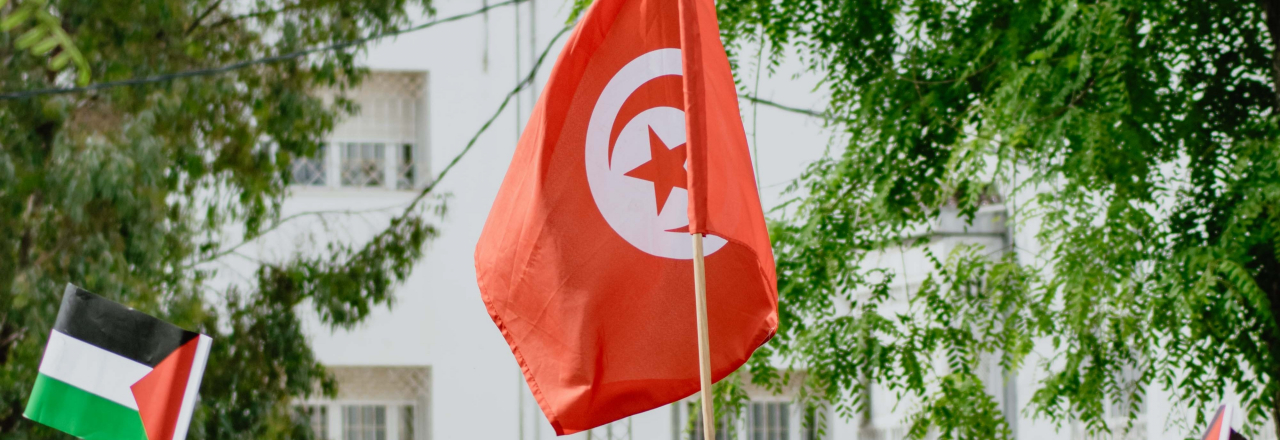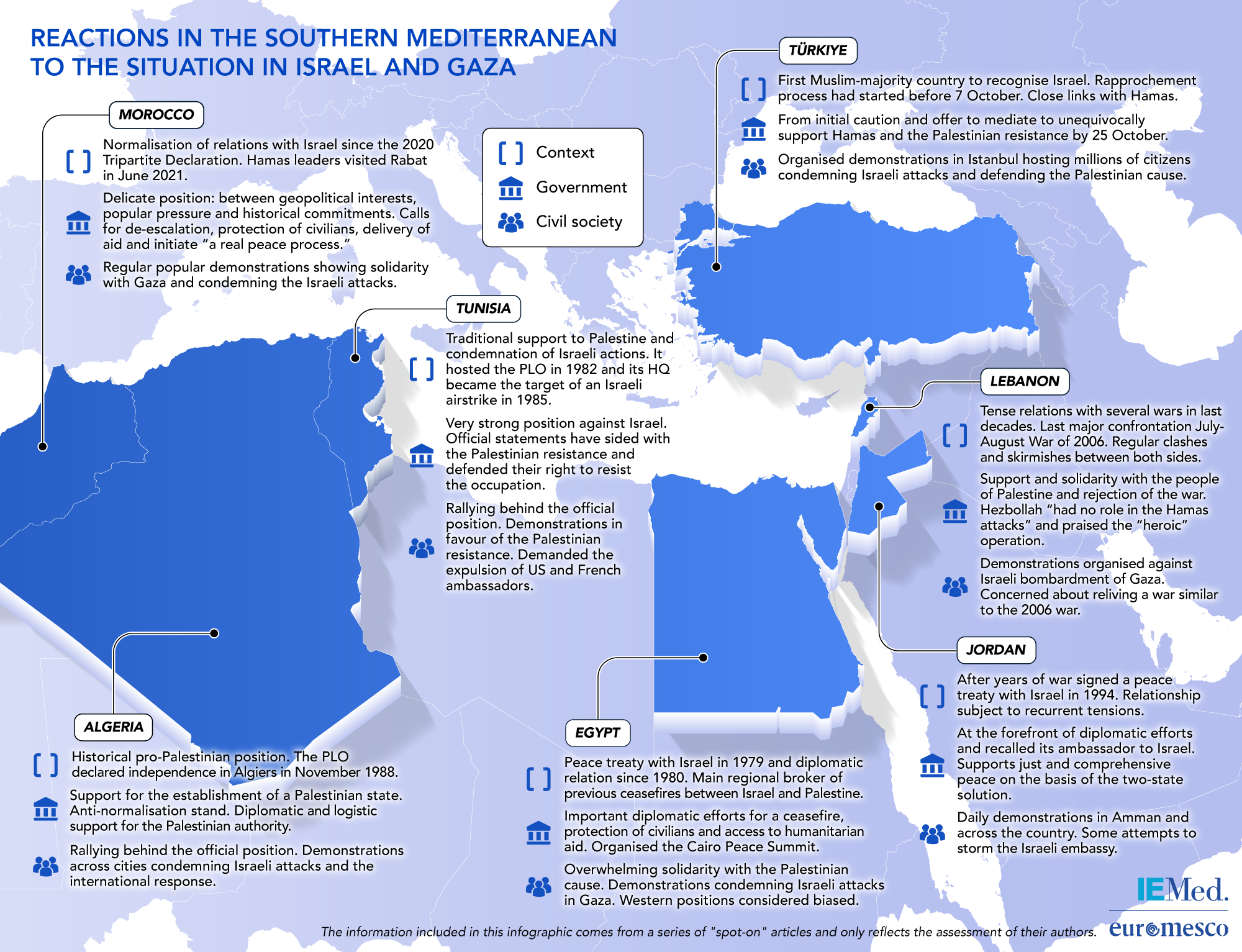

Abstract
Tunisia has traditionally expressed support to the Palestinian people and condemned Israeli actions that it considered contrary to international law. Following the Hamas attack on 7 October, the Tunisian Tunisia’s Presidency released a statement expressing “full and unconditional stand with the Palestinian people”, which distinguished Tunisia from the rest of the Arab countries. These reactions can positively affect domestic cohesion. However, weakened by years of political crises and economic hardship and by the inability to articulate a clear foreign policy doctrine, Tunisia risks losing traction on the regional or international scene. Moreover, the radicalisation of Tunisia’s position vis-à-vis its traditional Western partners and its new offbeat options concerning the Palestinian cause now could lead to further isolation.
For decades, Tunisia has always defended international legality expressed in United Nations resolutions. Tunisia’s commitment to the Palestinian cause led it to host the Palestinian Liberation Organization (PLO) in 1982, when it was forced to leave Lebanon after an Israeli military intervention. The headquarters of the PLO located in a suburb of Tunis became the target of a deadly Israeli air attack in 1985, causing the death of dozens of Palestinians but also Tunisians, thus creating an unwavering bond between the two peoples. Since then, Tunisia’s official reactions do not vary much depending on specific developments in the region, governments in place and international circumstances.
Tunisia has always considered the Palestinian Authority based in Ramallah as the legitimate authority representing the Palestinian people and has always been wary of Hamas despite a short period of affinity between 2011 and 2013. However, this did not prevent Tunisia from immediately expressing its “total and unconditional support” on 7 October, through an official statement of the President published by the Presidency. What is also worth observing is that the Tunisian President did not rush, as is usual, to contact Mahmoud Abbas, President of the Palestinian Authority, for consultations.

On the day of the Hamas attack (7 October), Tunisia’s Presidency released a statement expressing “full and unconditional stand with the Palestinian people”, which distinguished Tunisia from the rest of the Arab countries. The statement does not condemn the Hamas attack. The statement crosses the lines that other Arab governments refrained from crossing out of fear of being accused by Western powers or international organisations of being hostile to Israel and rejecting its right to exist.
Along the same lines, the statement does not stick to the term of “Gaza envelope” used by some media to refer to the territories around Gaza but reads that it is “Palestinian land suffering under the Zionist occupation.” Tunisia’s Presidency uses the term of “Zionism” and avoids using the term Israel, in order to portray it as an illegitimate entity. It insists on the Palestinians’ right to “reclaim all of the land of Palestine,” which implicitly means that Tunisia’s Presidency does not recognize the legitimacy of the state that was established in 1948. It also defends the right of the Palestinian people to reclaim “all Palestinian land, and it is also the right to establish its independent state and its capital Holy Jerusalem”. The statement also invites to recall previous crimes, “such as the massacres of Deir Yassin, Kafr Qasem, and Khan Yunis”.
All in all, the presidential statement sides unequivocally and without reservation with the “legitimate resistance”. It is true that it does not mention Hamas and other armed factions, but it clearly affirms “the right to legitimate resistance to the occupation” and argues this resistance should not be considered as an “aggression”.
As such, this official position expressed by the highest political authority of the country not only differs from the gist of other statements issued across the Arab world on that date, but also differs in fundamental aspects from the vision adopted by President Bourguiba since 1965, when he encouraged the Palestinians to accept the partition decision and establish their state on that basis. It also differs from the more cautious language used by Tunisian diplomats so far.
With this clear and definitive statement, the President confirmed that he does not accept the issue of normalisation, regardless of any pressure. This position will most likely result in a deepening of the gap that separates him from a number of heads of state who defended Israeli right to defend itself after the 7 October aggression. In this context, the Tunisian authorities expect that the pressures on Tunisia will intensify, in an attempt by certain international parties to weaken the Tunisian President politically and economically.
Tunisia then participated in the meeting of the Arab League Council on 11 October in Cairo after which Resolution No. 8987 was issued, a resolution which takes up the fundamentals of the Arab narrative concerning the conflict with Israel. Although Tunisia, represented by its Minister of Foreign Affairs, voted for it, the President of Tunisia invited, the day after the meeting, the same Minister to express his reservations on the entire text of the resolution.
In the same vein, Tunisia did not participate in the “Peace Summit” organised at the initiative of Egypt considering that no agreement was possible, or even sought, while the summit was seeking to find one.
Regardless of the calculations of the Tunisian internal conflict, the position of the President was welcomed by most components of the political spectrum, including those opposed to its policies. The Tunisian media, whether public or private, have been unanimous in “supporting the Palestinian resistance”, in “condemning Israel” and in “condemning the disinformation of Western media and their bias in favour of Israel”. These messages have also been widely taken up and disseminated through social media.
Prominent Tunisian civil forces, including the Tunisian General Labour Union (UGTT), the Bar Association as well as the Industry and Trade Union, declared their support for the Palestinians. The UGTT for instance issued a declaration on 7 October , where it reads that “The Al-Aqsa flood came as an appropriate response to the escalation of the crimes of the Zionist entity” and “that resistance is the most effective and surest way to restore rights, restore the land, and liberate it from the clutches of the brutal Zionist occupation”. It also announced the suspension of joint activities with international organisations and unions. It criticised the Italian Confederazione Italiana Sindacati Lavoratori for confusing victims and executioners and denounced the position of the International Confederation of Free Syndicates for going against the values and universal principles stipulated in all international conventions, expressing its readiness to withdraw from it. Last, it sent strongly worded messages to European Union countries because of what they considered to be a bias toward Israel. Some civil society organisations such as “I Watch” also decided to boycott American funding in rejection of the “unprecedented alignment” behind the occupation’s crimes against the Palestinians.
Several associations have launched a system of collecting donations for the benefit of Gaza in addition to the medical equipment collected by the Tunisian Red Crescent sent as part of the aid granted by the Government and transported to the Palestinian territories via Egypt.
These reactions came amid widespread and ongoing popular protests in the capital, Tunis, and other cities, where thousands went out to demonstrate, raising Palestinian flags and slogans in support of the Palestinian resistance, and demanding an end to the Israeli aggression and the expulsion of the Ambassadors of the United States and France.
The same crowd reiterated its demand to adopt a law criminalizing and sanctioning any normalisation with Israel. This idea was first put to the fore by certain political currents in the context of the drafting process of the 2014 Constitution. It is now gaining traction and fuelled by the position of the President, who considers “normalisation” to be an act of “high treason”. At the time of writing this article, the situation regarding this legislative proposal is as follows: a proposal has been tabled by a number of members of the Parliament and succeeded, even after examination in committee, in being scheduled in plenary. The MPs even started voting on the text article by article. However, in a twist of events, an intervention by the President of the Republic aborted the project. The President considers that “we are in a war of liberation not in a war of criminalization” and that “such a law can damage the national security of Tunisia”. The plenary is still suspended awaiting a suitable procedural outcome.
The Tunisian position formulated by the government, the different political currents, civil society and public opinion in general, creates a sudden situation of relative calm and stability on the Tunisian political scene, putting on hold the political quarrels around the concentration of powers in the hands of the President. The latter has benefited from the national cohesion that has consolidated around his positions.
However, this domestic cohesion, while beneficial to the President, risks not being beneficial for the country. Tunisia is already isolated as a result of its political instability and very difficult economic situation. Losing international support, particularly from European and American partners, could have consequences and further increase Tunisia’s direct dependence on its immediate Western neighbour.
This national cohesion, now spontaneously expressed, risks creating a new dividing line between those who advocate reason, a negotiated solution and international legality, and those who lean towards an irrational radicalisation which pleases a jubilant crowd, and which could be exploited for settling internal political scores.
In conclusion, Tunisia’s position seems to oscillate between unhealthy populism and genuine popular support. The Palestinian cause has always been favoured by Tunisian emotional fervour linked to the perpetuation of the conflict and the injustice suffered by the Palestinian people. On the other hand, Tunisia, weakened by years of political crises and economic hardship and by the inability to articulate a clear foreign policy doctrine, loses any possibility of playing any role on the regional or international scene, as this was the case in the past. The radicalisation of Tunisia’s position vis-à-vis its traditional Western partners and its new offbeat options concerning the Palestinian cause now prevent it from being on a constructive path, isolate it more and more, and fragilize it even more in face of threats to its security and violations of its sovereignty, although the intention was to defend them more fervently.


